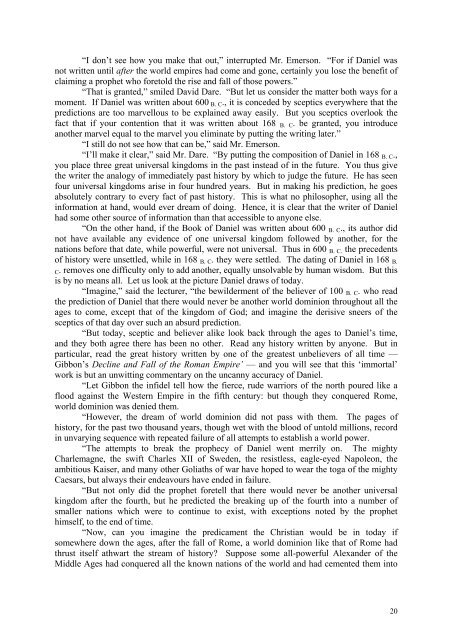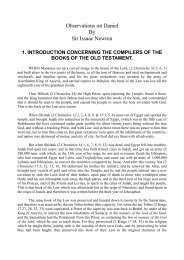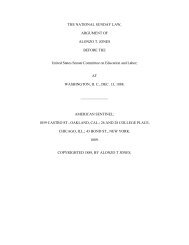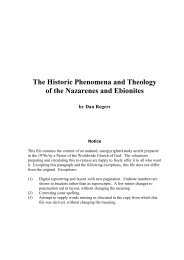Prophecy Speaks (E.A.Rowell).pdf
Prophecy Speaks (E.A.Rowell).pdf
Prophecy Speaks (E.A.Rowell).pdf
You also want an ePaper? Increase the reach of your titles
YUMPU automatically turns print PDFs into web optimized ePapers that Google loves.
“I don’t see how you make that out,” interrupted Mr. Emerson. “For if Daniel was<br />
not written until after the world empires had come and gone, certainly you lose the benefit of<br />
claiming a prophet who foretold the rise and fall of those powers.”<br />
“That is granted,” smiled David Dare. “But let us consider the matter both ways for a<br />
moment. If Daniel was written about 600 B. C., it is conceded by sceptics everywhere that the<br />
predictions are too marvellous to be explained away easily. But you sceptics overlook the<br />
fact that if your contention that it was written about 168 B. C. be granted, you introduce<br />
another marvel equal to the marvel you eliminate by putting the writing later.”<br />
“I still do not see how that can be,” said Mr. Emerson.<br />
“I’ll make it clear,” said Mr. Dare. “By putting the composition of Daniel in 168 B. C.,<br />
you place three great universal kingdoms in the past instead of in the future. You thus give<br />
the writer the analogy of immediately past history by which to judge the future. He has seen<br />
four universal kingdoms arise in four hundred years. But in making his prediction, he goes<br />
absolutely contrary to every fact of past history. This is what no philosopher, using all the<br />
information at hand, would ever dream of doing. Hence, it is clear that the writer of Daniel<br />
had some other source of information than that accessible to anyone else.<br />
“On the other hand, if the Book of Daniel was written about 600 B. C., its author did<br />
not have available any evidence of one universal kingdom followed by another, for the<br />
nations before that date, while powerful, were not universal. Thus in 600 B. C. the precedents<br />
of history were unsettled, while in 168 B. C. they were settled. The dating of Daniel in 168 B.<br />
C. removes one difficulty only to add another, equally unsolvable by human wisdom. But this<br />
is by no means all. Let us look at the picture Daniel draws of today.<br />
“Imagine,” said the lecturer, “the bewilderment of the believer of 100 B. C. who read<br />
the prediction of Daniel that there would never be another world dominion throughout all the<br />
ages to come, except that of the kingdom of God; and imagine the derisive sneers of the<br />
sceptics of that day over such an absurd prediction.<br />
“But today, sceptic and believer alike look back through the ages to Daniel’s time,<br />
and they both agree there has been no other. Read any history written by anyone. But in<br />
particular, read the great history written by one of the greatest unbelievers of all time —<br />
Gibbon’s Decline and Fall of the Roman Empire’ — and you will see that this ‘immortal’<br />
work is but an unwitting commentary on the uncanny accuracy of Daniel.<br />
“Let Gibbon the infidel tell how the fierce, rude warriors of the north poured like a<br />
flood against the Western Empire in the fifth century: but though they conquered Rome,<br />
world dominion was denied them.<br />
“However, the dream of world dominion did not pass with them. The pages of<br />
history, for the past two thousand years, though wet with the blood of untold millions, record<br />
in unvarying sequence with repeated failure of all attempts to establish a world power.<br />
“The attempts to break the prophecy of Daniel went merrily on. The mighty<br />
Charlemagne, the swift Charles XII of Sweden, the resistless, eagle-eyed Napoleon, the<br />
ambitious Kaiser, and many other Goliaths of war have hoped to wear the toga of the mighty<br />
Caesars, but always their endeavours have ended in failure.<br />
“But not only did the prophet foretell that there would never be another universal<br />
kingdom after the fourth, but he predicted the breaking up of the fourth into a number of<br />
smaller nations which were to continue to exist, with exceptions noted by the prophet<br />
himself, to the end of time.<br />
“Now, can you imagine the predicament the Christian would be in today if<br />
somewhere down the ages, after the fall of Rome, a world dominion like that of Rome had<br />
thrust itself athwart the stream of history? Suppose some all-powerful Alexander of the<br />
Middle Ages had conquered all the known nations of the world and had cemented them into<br />
20

















